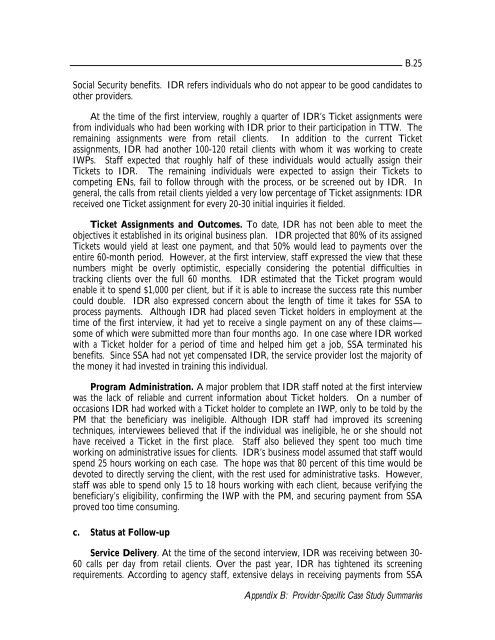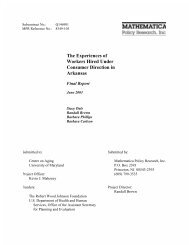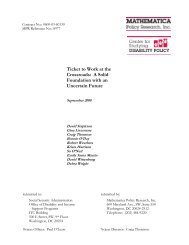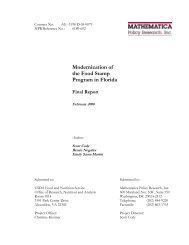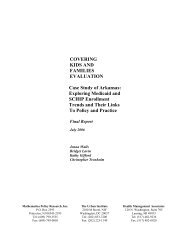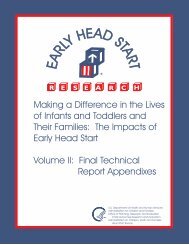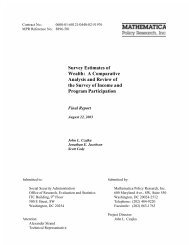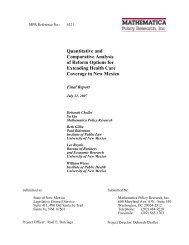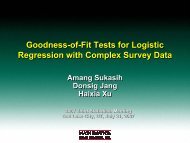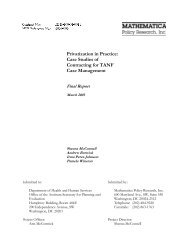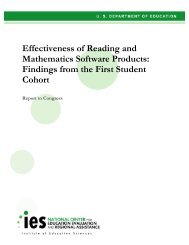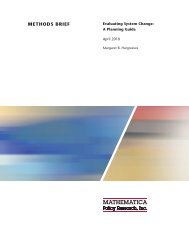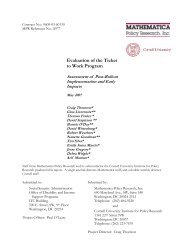Evaluation of the Ticket to Work Program Initial Evaluation Report
Evaluation of the Ticket to Work Program Initial Evaluation Report
Evaluation of the Ticket to Work Program Initial Evaluation Report
Create successful ePaper yourself
Turn your PDF publications into a flip-book with our unique Google optimized e-Paper software.
B.25<br />
Social Security benefits. IDR refers individuals who do not appear <strong>to</strong> be good candidates <strong>to</strong><br />
o<strong>the</strong>r providers.<br />
At <strong>the</strong> time <strong>of</strong> <strong>the</strong> first interview, roughly a quarter <strong>of</strong> IDR’s <strong>Ticket</strong> assignments were<br />
from individuals who had been working with IDR prior <strong>to</strong> <strong>the</strong>ir participation in TTW. The<br />
remaining assignments were from retail clients. In addition <strong>to</strong> <strong>the</strong> current <strong>Ticket</strong><br />
assignments, IDR had ano<strong>the</strong>r 100-120 retail clients with whom it was working <strong>to</strong> create<br />
IWPs. Staff expected that roughly half <strong>of</strong> <strong>the</strong>se individuals would actually assign <strong>the</strong>ir<br />
<strong>Ticket</strong>s <strong>to</strong> IDR. The remaining individuals were expected <strong>to</strong> assign <strong>the</strong>ir <strong>Ticket</strong>s <strong>to</strong><br />
competing ENs, fail <strong>to</strong> follow through with <strong>the</strong> process, or be screened out by IDR. In<br />
general, <strong>the</strong> calls from retail clients yielded a very low percentage <strong>of</strong> <strong>Ticket</strong> assignments: IDR<br />
received one <strong>Ticket</strong> assignment for every 20-30 initial inquiries it fielded.<br />
<strong>Ticket</strong> Assignments and Outcomes. To date, IDR has not been able <strong>to</strong> meet <strong>the</strong><br />
objectives it established in its original business plan. IDR projected that 80% <strong>of</strong> its assigned<br />
<strong>Ticket</strong>s would yield at least one payment, and that 50% would lead <strong>to</strong> payments over <strong>the</strong><br />
entire 60-month period. However, at <strong>the</strong> first interview, staff expressed <strong>the</strong> view that <strong>the</strong>se<br />
numbers might be overly optimistic, especially considering <strong>the</strong> potential difficulties in<br />
tracking clients over <strong>the</strong> full 60 months. IDR estimated that <strong>the</strong> <strong>Ticket</strong> program would<br />
enable it <strong>to</strong> spend $1,000 per client, but if it is able <strong>to</strong> increase <strong>the</strong> success rate this number<br />
could double. IDR also expressed concern about <strong>the</strong> length <strong>of</strong> time it takes for SSA <strong>to</strong><br />
process payments. Although IDR had placed seven <strong>Ticket</strong> holders in employment at <strong>the</strong><br />
time <strong>of</strong> <strong>the</strong> first interview, it had yet <strong>to</strong> receive a single payment on any <strong>of</strong> <strong>the</strong>se claims—<br />
some <strong>of</strong> which were submitted more than four months ago. In one case where IDR worked<br />
with a <strong>Ticket</strong> holder for a period <strong>of</strong> time and helped him get a job, SSA terminated his<br />
benefits. Since SSA had not yet compensated IDR, <strong>the</strong> service provider lost <strong>the</strong> majority <strong>of</strong><br />
<strong>the</strong> money it had invested in training this individual.<br />
<strong>Program</strong> Administration. A major problem that IDR staff noted at <strong>the</strong> first interview<br />
was <strong>the</strong> lack <strong>of</strong> reliable and current information about <strong>Ticket</strong> holders. On a number <strong>of</strong><br />
occasions IDR had worked with a <strong>Ticket</strong> holder <strong>to</strong> complete an IWP, only <strong>to</strong> be <strong>to</strong>ld by <strong>the</strong><br />
PM that <strong>the</strong> beneficiary was ineligible. Although IDR staff had improved its screening<br />
techniques, interviewees believed that if <strong>the</strong> individual was ineligible, he or she should not<br />
have received a <strong>Ticket</strong> in <strong>the</strong> first place. Staff also believed <strong>the</strong>y spent <strong>to</strong>o much time<br />
working on administrative issues for clients. IDR’s business model assumed that staff would<br />
spend 25 hours working on each case. The hope was that 80 percent <strong>of</strong> this time would be<br />
devoted <strong>to</strong> directly serving <strong>the</strong> client, with <strong>the</strong> rest used for administrative tasks. However,<br />
staff was able <strong>to</strong> spend only 15 <strong>to</strong> 18 hours working with each client, because verifying <strong>the</strong><br />
beneficiary’s eligibility, confirming <strong>the</strong> IWP with <strong>the</strong> PM, and securing payment from SSA<br />
proved <strong>to</strong>o time consuming.<br />
c. Status at Follow-up<br />
Service Delivery. At <strong>the</strong> time <strong>of</strong> <strong>the</strong> second interview, IDR was receiving between 30-<br />
60 calls per day from retail clients. Over <strong>the</strong> past year, IDR has tightened its screening<br />
requirements. According <strong>to</strong> agency staff, extensive delays in receiving payments from SSA<br />
Appendix B: Provider-Specific Case Study Summaries


